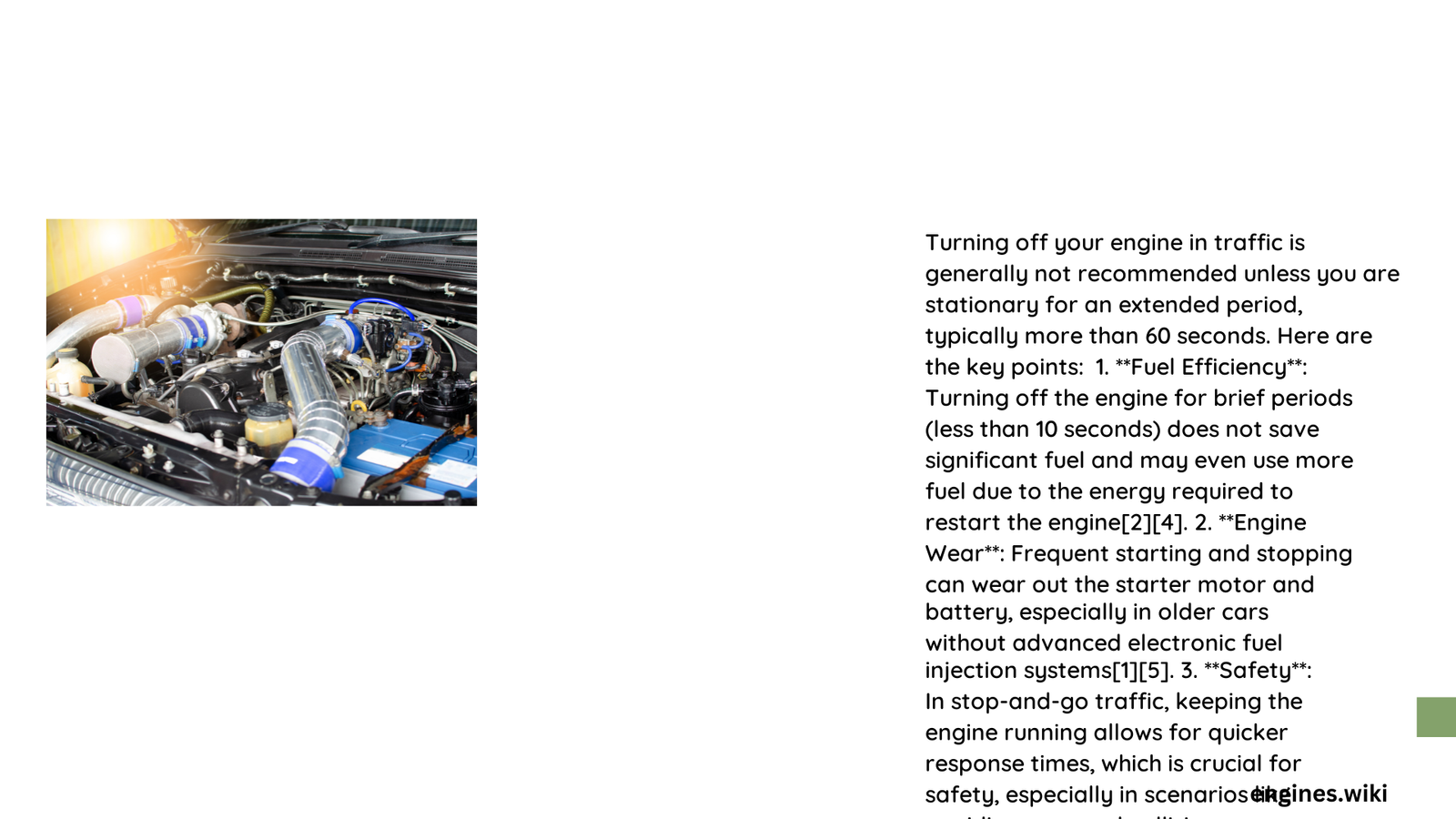Should You Turn Off Your Engine in Traffic: Expert Analysis
Quick Overview: Traffic Engine Management
Modern drivers face a critical decision when stuck in traffic: keep the engine running or shut it down. Vehicle experts and environmental researchers have extensively studied this dilemma, revealing complex implications for fuel consumption, vehicle performance, and ecological sustainability. Understanding the nuanced factors can help drivers make informed decisions that balance efficiency, safety, and environmental responsibility.
What Happens When You Idle Your Vehicle?
Fuel Consumption During Traffic Standstills
| Vehicle Type | Fuel Consumption (Gallons/Hour) |
|---|---|
| Compact Car | 0.16 – 0.20 |
| Sedan | 0.20 – 0.50 |
| Large Truck | 0.75 – 1.00 |
When your vehicle remains stationary, it continues consuming fuel without generating productive movement. This idle state represents a significant waste of resources and contributes to unnecessary environmental pollution.
Why Should Drivers Consider Engine Shutdown?
Environmental Impact Factors
Drivers should consider turning off their engine in traffic due to several critical reasons:
- Reduced Carbon Emissions
- Idling produces unnecessary greenhouse gases
- Each hour of idling releases approximately 1 pound of CO2
-
Contributes to local air quality degradation
-
Fuel Economy Benefits
- Modern vehicles consume more fuel while idling than during restart
- Estimated savings of 10-15% on fuel costs by minimizing idle time
- Reduces overall vehicle operational expenses
When Is Engine Shutdown Recommended?
Traffic Scenario Analysis
Recommended engine shutdown scenarios include:
- Stops longer than 10 seconds
- Traffic signal waiting periods
- Construction zone delays
- Railroad crossing waits
- Drive-through queues
Technical Considerations for Engine Management
Vehicle System Implications
Modern vehicles, especially those with start-stop technology, are designed to handle frequent engine shutdowns. Key technological advancements include:
- Enhanced starter motor durability
- Improved battery charging systems
- Sophisticated engine management software
- Reduced wear on internal components
Safety Precautions During Engine Shutdown
Critical Operational Guidelines
While turning off your engine offers numerous benefits, drivers must consider:
- Maintain awareness of traffic flow
- Ensure quick restart capability
- Monitor surrounding traffic conditions
- Use hazard lights if necessary
- Keep key in accessory position for rapid restart
Legal and Regulatory Landscape
Anti-Idling Regulations
Many jurisdictions have implemented strict anti-idling laws:
- Typical restrictions: 3-5 minutes maximum idle time
- Potential fines ranging from $50 to $500
- Enforcement in urban and environmentally sensitive areas
Conclusion: Practical Recommendations
Drivers should strategically approach engine management during traffic situations. While general guidelines suggest turning off the engine for stops exceeding 10 seconds, individual vehicle characteristics and specific traffic conditions play crucial roles in decision-making.
Reference:
- Argonne National Laboratory Research
- Environmental Protection Agency Guidelines
- Society of Automotive Engineers Publications
Pro Tip: Consult your vehicle’s manual for specific manufacturer recommendations regarding start-stop functionality and idle management.

